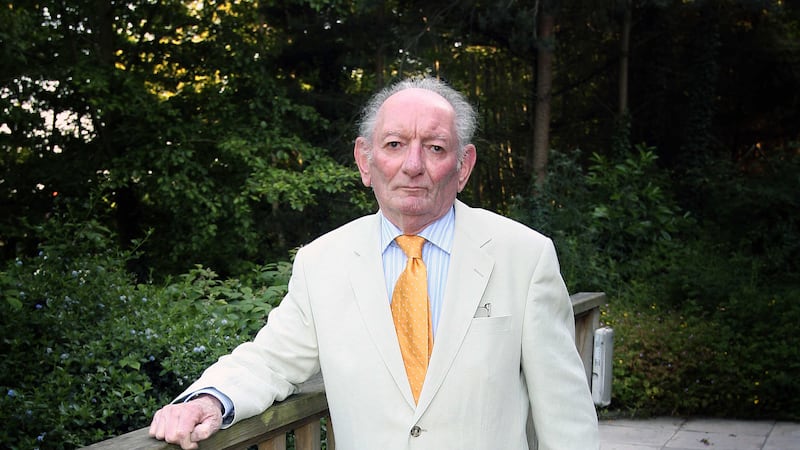I saw a well-known Irish actor in a Belfast coffee shop a few days ago, someone whose work I greatly admire.
I half-considered speaking over to compliment him. But he sat pensive and thoughtful, not bothered about being unbothered.
Someone with whom he’d worked closely had passed away last week, and was buried on Sunday – the late Brian Friel.
The name of Brian Friel was one I’d often heard, growing up in our house. There was an almost rural familiarity to it – a bit like Seamus Heaney’s, respected as much for being local as legend.
In Mr Friel’s case, the ripple of association was the Slemish Players and its 1970s production of ‘Philadelphia, Here I Come!’ where my daddy, Oliver, and (younger) Liam Neeson paired up as Gar in his private and public guises.
Now and again you’d hear daddy reciting flashes from the play, or I’d dip into the heavily annotated script tucked into the bookcase.
The weight of the words that dominated Brian Friel’s social insight was – and remains – monumental. The playwright’s voice spoke aloud sentiments that others could only ever feel innately or think abstractly. He revealed a capacity for truth-telling that laid bare life’s great lies and shone spotlights on Ireland’s deepest cultural secrets.
His particular focus on the golden essence of words in their universal context was powerful. In ‘Translations’, Hugh says: "But remember that words are signals, counters. They are not immortal. And it can happen – to use an image you’ll understand – it can happen that a civilisation can be imprisoned in a linguistic contour which no longer matches the landscape of fact."
In contemporary Ireland and Britain, Hugh’s words aren’t merely relevant to the legacy of colonisation in spoken language – English dominating an Gaeilge.
As our Irish-Anglo relationship (why is that phrase normally reversed?) has changed and developed in the interim 35 years, the meaning and metaphor of Hugh’s words also touch the very values which underlie our public and political discourse.
The extent to which words have become "imprisoned in a linguistic contour which no longer matches the landscape of fact" is frequently evidenced by the disjoint between that political rhetoric and public reality.
So often the political imperative is to frame and ‘spin’ the meaning of words around established realities with which they are totally in conflict.
But when that happens, when words are contrived as seemingly clever political tactics or abused as bureaucratic defensive lines, then their worth is fatally diminished: they lose their value because they have no depth of meaning.
(Likewise in our personal lives, where words like friendship or honesty or love are so often corrupted by the contours of unresolved fears or past hurts – or, worse, the negative diktats of others, or blindness of selfish ambition.)
The point was illustrated during British chancellor George Osborne’s speech on Monday at the Conservative Party conference in Manchester.
Mr Osborne’s family has long Irish-Anglo linkages. (There it is again.) His family hold 'titles' in Tipperary and Waterford, and he also wields Westminster’s ministerial authority over Britain’s budgets here in the north.
Yet as he stood speechifying before conference themes declaring ‘security’ and ‘stability’, Mr Osborne apparently didn’t see the irony that his very policies - which are provoking social instability - could, in fact, be the cause of genuine insecurity.
Or perhaps he did see it. And perhaps his use of words is an intentional effort to try and mould `the landscape of fact' despite the truth being contoured very differently.
As he waxed about being the champion of workers and `owning the middle ground', it was left to health secretary Jeremy Hunt to unwittingly provide the `translations' for Mr Osborne’s discourse.
In an off-the-cuff remark, Mr Hunt revealed that welfare cuts and tax credit changes are `a very important cultural signal' to show people here are prepared to `work hard in the way that Asian economies are prepared to work hard'.
That’s code for an economy of low-pay, long-hours, non-unionised, de-regulated, two-tier, universal labour with the very barest minimum of social welfare support and privatised public services. And it’s a far cry from the culture of collectives and communities out of which today’s Ireland (both Irish and Anglo) has grown.
Perhaps the solution lies in more politicians becoming like playwrights, in their genuine depths of concern and conviction for the meaning and magic of words.
Or perhaps we just need as many playwrights as politicians, shining subtlety and honesty onto that gaping chasm that so often exists between the ruse of rhetoric and `the landscape of fact'. As Brian Friel did.
j.kearney@irishnews.com








